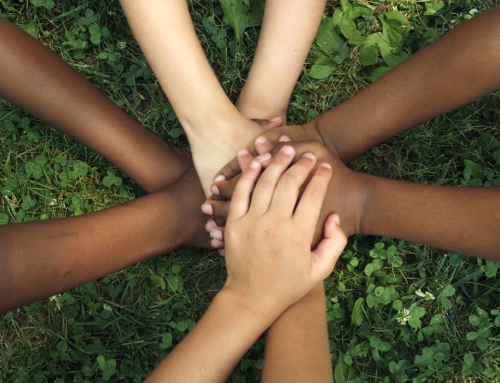10-02-2020
Expertise
About two years ago I was working on a project for the GGD (Municipal health service), in which I focused on how young children should be made more aware of the consequences of sending nude pictures via social media. Since social media have become such a big part of this generation’s life, children are often not yet aware of how huge the consequences can be. Especially of sending risky pictures. It has already happened a lot of times that those pictures ended up all over the internet, ruining someone’s life.
That same year I was researching about my personal interests. I was researching a lot about high sensitive people (HSP). Research assumes that non-high sensitive people have a filter in their brains that all the information from the senses first passes through before the brain recognizes it. It is being processed first. Highly sensitive people do not have this filter. This means that there is a lot of information that needs to be conceived in one go. This can lead to overstimulation, fatigue, becoming emotional, and more noise (Hooggevoeligheid, n.d.).
Last year, I followed the course Sociology during my exchange in Sweden. The reason for following this course was to find out more about social relations between people. I had an interest in the behavior of people and why we do certain things. Also, on how we are influencing each other. Do we do things for ourselves or for others? And when do we think about ourselves and when do we think about others? During this course, I also learned that social media plays a big role in how we present ourselves nowadays. We can create an entire profile for people to quickly scan who we are as a person, without ever having to see or speak to us.
Looking back at the different topics I dived into, I see a big connection. If we look at sociology and HSP, I see a relation with our behavioral social aspect. Who are we in this society? And how do we behave around people? The project about sexting also shows a connection to this behavioral aspect, but then just like sociology, online. How are we using social media to fit in? And what influence does social media have on our daily life? I notice that I find the social media aspect very interesting as it has become a big part of our society. Many things happen on social media and because of social media, and I notice that I find it interesting to know how we handle this big technical revolution. Therefore, I think my interest then lies in both social media and our behavior.
Surveillance Capitalism
Furthermore, I started to research on my professional interests. My biggest interest was with social media and I also tried to see if I could find a deeper connection with social media and behavior. By reading different articles I came to the topic of surveillance capitalism. Surveillance capitalism is offering free services on the internet that billions of people use cheerfully, allowing the people who offer those services to follow the behavior of those users in every detail, often without their explicit permission (Naughton, 2019). To then sell their information to other companies.
Surveillance capitalism was invented in 2001, the year of 9/11. A few days before 9/11 happened, there were already some concerns about privacy. However, a few hours after the tragedy happened, the conversation changed from a concern about privacy to “total information awareness” (Zuboff, 2019). The competitive dynamics of surveillance capitalism have created some powerful authorizations that are driving companies to produce better behavioral-prediction products. When investors came under pressure, Google decided to increase their advertising revenue by using their access to users’ data to predict and generate click frequencies as a signal of the relevance of an advertisement. Therefore, they eventually discovered that it does not only mean collecting many amounts of data but also intervening in our behavior. The company developed new methods for storing secret data that users deliberately wanted to keep private. This surplus of data would then be analyzed, for example, to predict click behavior. This data became the basis for “targeted advertising”. Google finally went public in 2004, when it was revealed that between 2001 and 2003, their revenues were increased by advertising (Zuboff, 2019). As also appears from Google’s annual advertising revenue from 2001 to 2019 (Clement, 2020).
Facebook is a good example of a company that is much aware about the data of their users. An internal Facebook document from 2017, arranged for an Australian bank, shows the large user base of Facebook on high schoolers and young people. Additionally, it illustrated how Facebook can know when these youngsters are feeling down or “worthless” about themselves. This is shocking as advertisers can use this user data to take advantage of the emotional insecurities which these young people are feeling, to sell their products (Pearson, 2017). In the wake of The Australian’s report, Facebook clarified that the document was just research and not a new advertising tool. They make these documents so that advertising partners can make campaigns that work with how people are using the platform (Pearson, 2017). However, telling companies to make advertisement for young people that are feeling worthless, still makes it a concern.
The company also faced significant backlash after they published results of a big experiment in which it manipulated information on 689,000 users’ home pages and discovered that it could change the feelings of people by an ‘emotional contagion’ process. The company secretly conducted the research. Critics said this was wrong given that its purposefully exposing some people to “negative emotional content”. Facebook apologized and issued a new set of guidelines for research projects (Levin, 2017).
The challenge
After all this research, I am convinced that I want to ensure that the importance of data is focused on people instead of companies. At the moment, our data is used to determine our behavior and thereby influence us through advertisements on what we will buy and what choices we make online. This is all in the interest of companies and their income. I want to turn this around. Mankind must be able to benefit from their data, not be bribed.
In addition, I want to focus primarily on emotional manipulation. As Facebook can indicate when which young children are feeling “worthless”. Right now, these emotions are being played with. Businesses can reap the benefits by exploiting these feelings and targeting certain advertisements that manipulate children into buying certain products. But what if we turn it around? What if we get the positive out of these data for the sake of humanity? Would it not be nice if, for example, Jeugdzorg could respond to this problem? To recognize who can use which help from the data they receive from Facebook? Viewing our behavioral data must be used in a positive way.
Therefore, my challenge is that the citizen should benefit from the use of his data instead of companies using this to earn money.
Looking back at my previous projects and experiences, I think this fits my interest as it is connected to social media, but also focuses on our behavior. This project can give me the opportunity to change our behavior to a positive benefit for us people, instead of for companies. My focus is to find a company that can work together with me in the sake for human kind.
References
Clement, J. (2020, February 5). Advertising revenue of google. Retrieved from statista: https://www.statista.com/statistics/266249/advertising-revenue-of-google/
Hooggevoeligheid. (n.d.). Retrieved from Psychologiemagazine: https://www.psychologiemagazine.nl/thema/hooggevoeligheid/
Levin, S. (2017, May 1). Facebook advertising data insecure teens. Retrieved from The guardian: https://www.theguardian.com/technology/2017/may/01/facebook-advertising-data-insecure-teens
Pearson, J. (2017, May 1). facebook has to keep apologizing for its business model. Retrieved from vice: https://www.vice.com/en_us/article/ezyjqp/facebook-has-to-keep-apologizing-for-its-business-model





